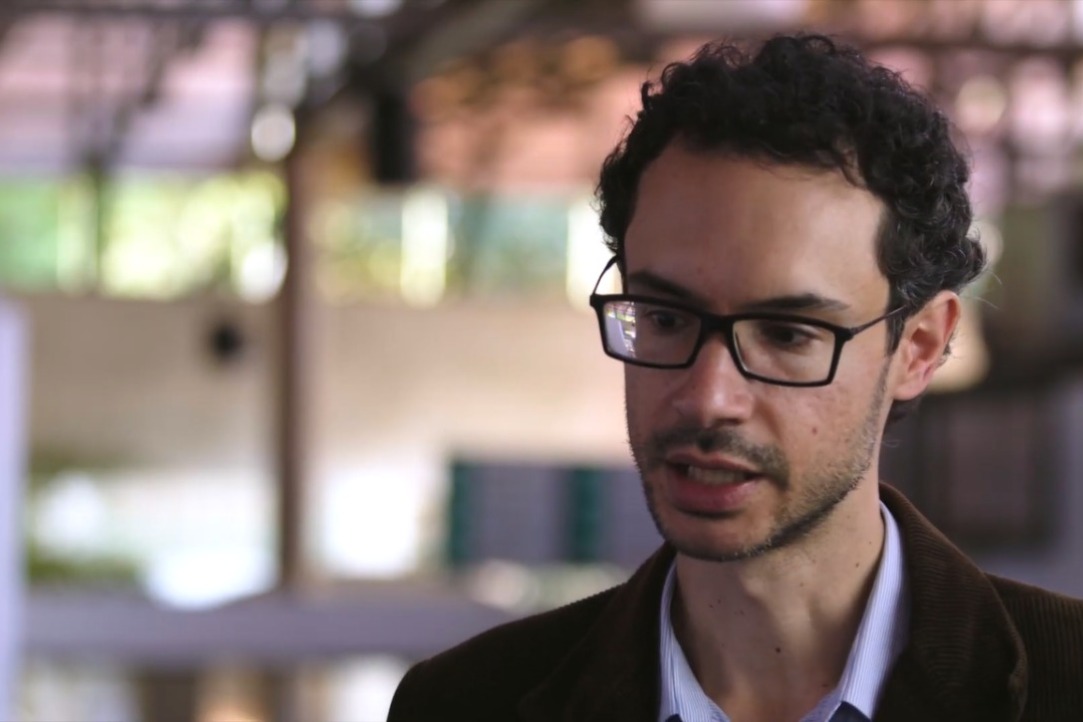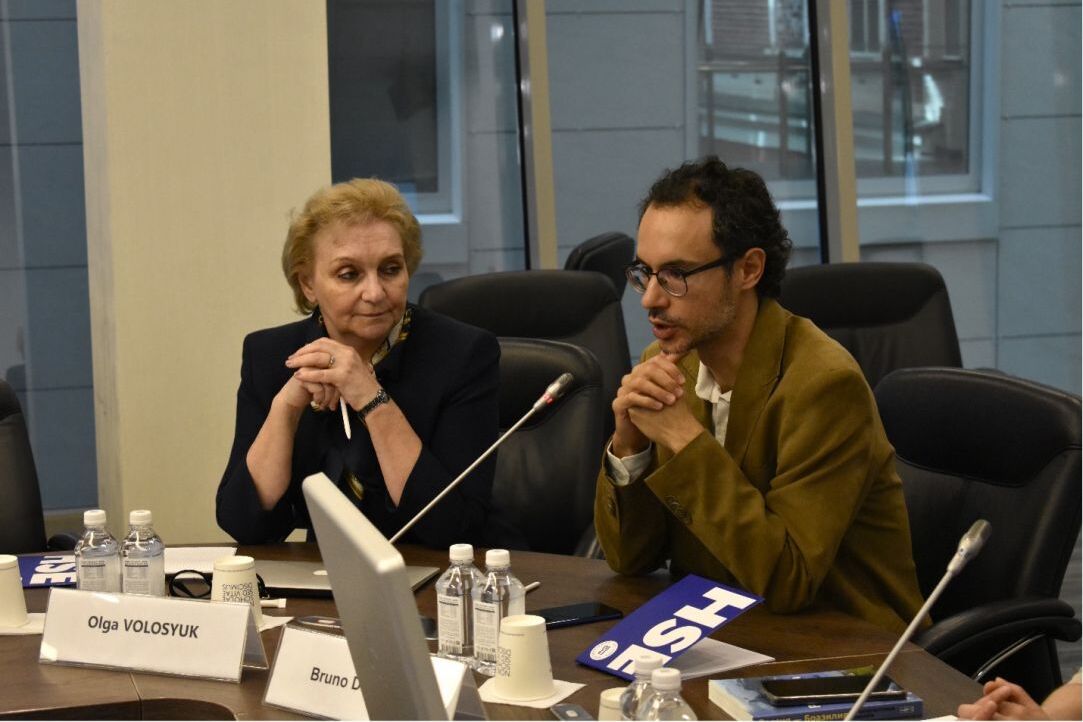‘It Is Absolutely Necessary for Scholars and Students to Be in Contact with Peers Around the World’

Bruno de Conti, Assistant Professor at the University of Campinas (Unicamp, Brazil), has been cooperating with the HSE School of International Regional Studies for a few years. In his interview with the HSE News Service, he talks about the importance of developing academic cooperation between Russia and Brazil and shares his impressions of HSE University and Moscow.
Bruno De Conti is an Assistant Professor at the University of Campinas (Unicamp, Brazil). He holds a PhD in Economics from the University of Paris 13 (France) and Unicamp. His research interests include the international monetary system, as well as the economies of China and BRICS.
— You have been successfully cooperating with HSE for a few years. What do you value in this partnership?
— The partnership with HSE University is one of the most important partnerships of the Institute of Economics at the University of Campinas. For economic and political reasons, Brazilian universities have been historically collaborating much more with universities from the USA or Western Europe and I have always claimed that it's necessary to collaborate with universities from other parts of the world.
This partnership with HSE is very eloquent in showing how much we can learn from Russian universities.
Over the last years, we have been intensively developing academic collaboration through the exchange of both scholars and students, joint organisation of seminars and roundtables, and co-authorship in articles.
— What is planned for the nearest future?
— Prof. Alina Shcherbakova will be one of the lecturers at the IV BRICS Network University Winter School, which we are organizing in Campinas in July 2024. We are working on the establishment of a joint-degree Master’s programme between HSE and Unicamp. Yulia Khamaganova da Silva is a PhD student whose thesis is supervised by me, and she has just arrived in Moscow to spend one academic semester developing research at HSE. Hopefully, her thesis will result in the first double degree issued by HSE and Unicamp.
— What do you think about international cooperation between researchers and Universities today in the world of globalisation?
— It is absolutely necessary for scholars and students to be in constant contact with their peers all over the world. There is no better way to create new knowledge, to disseminate and adapt it to the needs of the population. We are now facing existential challenges, such as climate change, and if we do not face them collectively, we will perish collectively.
In April 2024, Bruno De Conti delivered an open lecture on Brazilian presidency in G20 at the HSE School of International Regional Studies.

— What are your impressions of the lecture at HSE University?
— For me, it was very interesting to share my thoughts on Brazil's G20 presidency with a large audience of scholars, students, and even a member of the Brazilian Embassy in Moscow. The questions raised by the audience were extremely interesting and we had a nice moment for discussions.
I think Russia and Brazil have a lot of common ground in the efforts to change the current international order.
I am very thankful for the invitation made by Ana Livia Esteves and to all scholars from HSE who gave me the opportunity to give this lecture. For those who are interested in these discussions, the article is here.
— How do you feel about Moscow?
— Moscow is one of my favourite cities in the world! I am always happy to spend some time there. In the current context, the most impressive thing is realising that the Russian economy is doing very well, in spite of the sanctions imposed by the USA and some other Western countries. Walking in Moscow for a week made me realise that unlike what one could imagine from a foreign perspective, the city keeps developing successfully.
See also:
From Mexico to Buenos Aires: HSE University–St Petersburg Enhances Cooperation with Leading Universities in Latin America
New mobility programmes, academic exchanges, and unexpected collaborations—these are the results of the HSE University–St Petersburg delegation's mission to Latin America. Read on to find out about the key agreements made.
‘Artificial Intelligence Has Become the Lifeblood of the Global Economy’
Experts from HSE University took part in the BRICS Academic Forum (FABRICS) held in the capital of Brazil this year. The main theme of the event was to discuss cooperation among countries in the Global South amid geopolitical turbulence and rapid technological change. Academics and experts from BRICS member states and partner nations explored topics such as global healthcare, AI technologies, trade, climate change, and reform of the multilateral global security and governance architecture.
Viva o Brasil!: HSE University–St Petersburg Hosts Festival of Brazilian Culture
HSE University–St Petersburg wrapped up International Partners' Week with a lesson on Portuguese, a workshop on the dances of various Brazilian regions, a lecture about one of the most popular Brazilian musicians and a live performance by his devotees. Organised by the Bachelor’s programme in Media Communications, the 'Viva o Brasil!' festival invited students to explore the culture of one of the largest countries in Latin America.
First Lady of Brazil Visits HSE University
On May 7, Janja Lula da Silva—the First Lady of Brazil and a prominent advocate for sustainable development who initiated the Global Alliance Against Hunger and Poverty—visited HSE University. She held a meeting with HSE University Rector Nikita Anisimov, where they explored promising avenues for strengthening Russia–Brazil collaboration in science and education. HSE University also hosted a round table discussion titled ‘The Global Alliance Against Hunger and Poverty as a Key to Modern International Cooperation,’ featuring Janja Lula da Silva as a distinguished guest.
‘Brazilians and Russians Share a Unique Connection’
Tobias Vilhena de Moraes is a historian working at Museu Lasar Segall inSão Paulo, Brazil, and a faculty member of the Institute of Philosophy and Human Sciences at the University of Campinas. He is now working on a master’s degree at HSE University-St Petersburg.
‘The Defence Was Both Interesting and Nerve-Wracking’
Ana Livia Araujo Esteves, from Brazil, lecturer at the HSE School of International Regional Studies, has recently defended her PhD at HSE University. In her interview with the HSE News Service, she talks about her research into Brazilian–Russian relations, the difficulties of the thesis defence process, and her further plans in academia.
HSE and University of Campinas Celebrate World Logic Day Together
On January 15, 2025, the Russian-Brazilian Colloquium on Logical Pluralism was held at the HSE International Laboratory for Logic, Linguistics and Formal Philosophy to mark World Logic Day. This event was part of the joint project ‘Pluralistic Perspectives on Logic and Formal Philosophy,’ implemented by the laboratory and the Centre for Logic, Epistemology and the History of Science at the University of Campinas (Brazil) under the International Academic Cooperation competition.
Bringing Maths and Philosophy Together: Russian-Brazilian Project Explores Logical Pluralism
In late October and early November, HSE University hosted the Autumn School on ‘Logic and Formal Philosophy’ and a conference on logical pluralism as part of a collaborative project uniting Russian and Brazilian philosopher-logicians and mathematician-logicians. The project’s leaders and participants, Elena Dragalina-Chernaya, Itala Loffredo D'Ottaviano, Marcelo Esteban Coniglio, and Evandro Luis Gomes, shared their insights about the initiative.
HSE University Negotiates to Launch Joint Projects with Leading Universities in Brazil
In the framework of the academic mission to Latin America, HSE University-St Petersburg has negotiated to launch joint projects with leading Brazilian universities. Thus, with the University of São Paulo, the first in the QS ranking among Brazilian universities, HSE plans to carry out joint research aimed at supporting biodiversity, developing biotechnologies and solving ecological and social issues.
HSE University to Expand Cooperation with Brazilian Universities
On October 14, 2024, International Partnership Day Russia–Brazil took place at HSE University. The event was organised in collaboration with the Brazilian Embassy in Moscow and marked the first Brazilian academic and scientific mission to Russia, leading to the signing of cooperation agreements between HSE University and four Brazilian universities.


